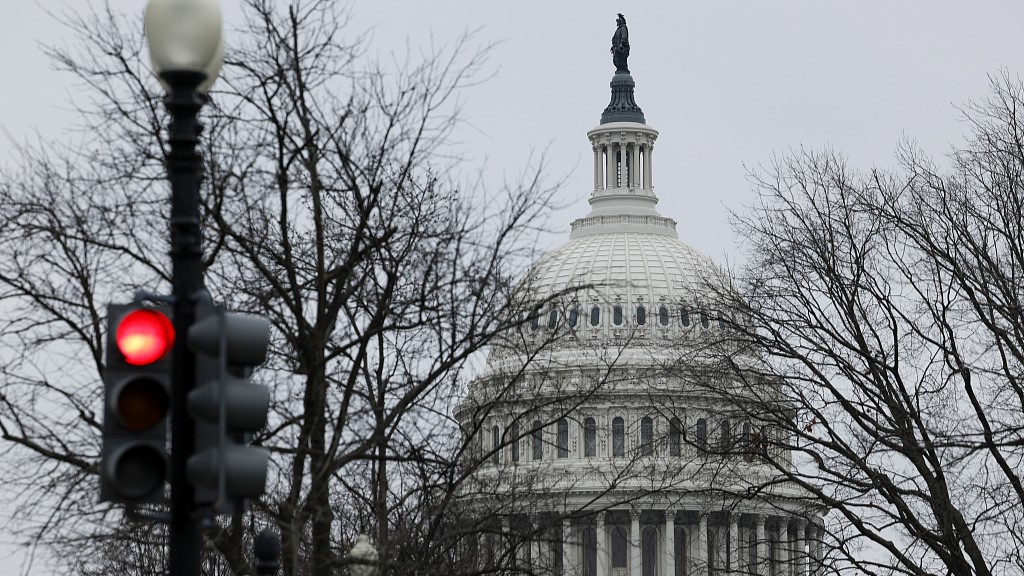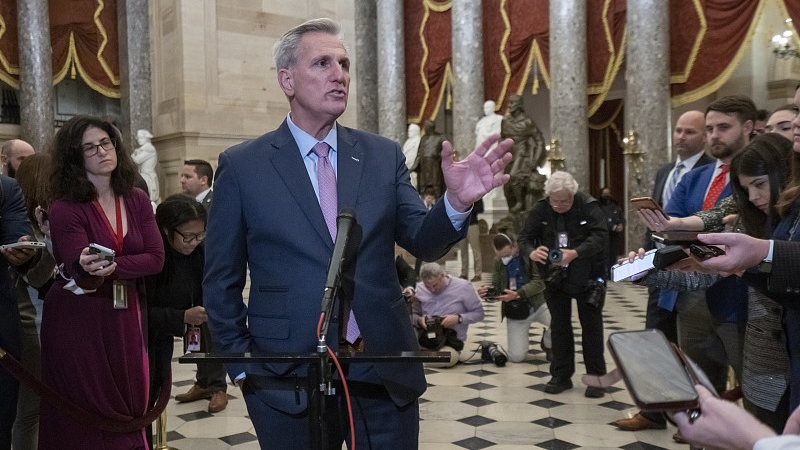
The U.S. Capitol Building in Washington, D.C., U.S., January 19, 2023. /CFP
The U.S. Capitol Building in Washington, D.C., U.S., January 19, 2023. /CFP
Editor's note: Thomas O. Falk is a London-based political analyst and commentator. He holds a Master of Arts in international relations from the University of Birmingham and specializes in U.S. affairs. The article reflects the author's opinions and not necessarily the views of CGTN.
According to estimates by the U.S. nonpartisan Congressional Budget Office on February 15, Washington's government faces a financial default between July and September unless the debt ceiling of 31.4 trillion U.S. dollars is raised. The situation is serious, with major repercussions for the ailing American economy.
The U.S. Treasury can not make interest payments or pay investors, including large investment firms, private individuals, central banks or other states holding U.S. treasury bonds. The U.S. begins to look like a nation unable to sort out its fiscal responsibilities and appears unreliable to its lenders. Moreover, the Treasury Bill, a U.S. government debt obligation backed by the Treasury Department, are considered the safest investment in the world and are in countless funds and financial products. A default would trigger a domino effect leading to a global recession.
Both Democratic and Republican presidents have struggled with the debt limit for decades. Bill Clinton was the last president who presented America with a budget surplus – 22 years ago. But now, the debt ceiling has transformed into tribalism and polarization. Negotiations have become about America's power plays and careers, with little regard for economic implications.
Historically, Democrats and Republicans could agree in the past – the usual political theatre notwithstanding – however, there are no indications that negotiations will suffice in 2023. The newly-elected Republican-majority in the U.S. House of Representatives, requires President Joe Biden needing their votes to resolve the crisis.
Talks are ongoing between the administration and Congress, including between Biden and Republican House Speaker Kevin McCarthy. Both had recently expressed confidence that an agreement could be reached. But how realistic is such an agreement if neither side is willing to compromise? Accordingly, Republicans will ask for too much, while Biden will not be inclined to give anything in return.
Biden said in his State of the Union address that he was not prepared to cut social programs. He only wants to negotiate cuts after Congress has approved an increase in the debt limit. He enters negotiations with pre-conditions, which does not seem clever, given the urgency.
Nonetheless, Biden is cognisant that he can ill-afford to be put in a position where it appears that he's being pressured into submission by Republicans, especially since he will likely run again in 2024. Succumbing to Republican demands will weaken his standing within the Democratic Party even further. Current polls suggest only 37 percent of Democrats want Biden to run again.

U.S. Speaker of the House Kevin McCarthy speaks to reporters in Statuary Hall after being elected Speaker in the House at the U.S. Capitol in Washington, D.C., U.S., January 7, 2023. /CFP
U.S. Speaker of the House Kevin McCarthy speaks to reporters in Statuary Hall after being elected Speaker in the House at the U.S. Capitol in Washington, D.C., U.S., January 7, 2023. /CFP
Meanwhile, Republicans might not at all be interested in a solution. The Freedom Caucus, for example, has been criticized for obstructing policy just for obstructionism's sake, and has displayed limited interest in traditional legislation.
Usually, it would be McCarthy's job to get these House members in line. But the House Speaker vote earlier demonstrated, his control over this group is limited. Moreover, one concession he had to make to become Speaker was to allow for a vote on his future as soon as a single member of Congress demands it. Even more importantly (and problematic) is that the usual mechanisms of persuasion in Washington are unlikely to work with the Freedom Caucus.
Members of the House of Representatives are supported in their campaigns by donors, and fundraising to keep these politicians in office. Whoever raises the most money has the best shot to keep his seat in Congress.
Donors can be global cooperations or wealthy individuals. These major donors often lobby for their interests. If a member of the House (or Senate) doesn't comply with his donor's interests, the financial support will cease. In some cases, this will result in an immediate career end. It's not difficult to figure out that the average Congressman, whose biggest donor is a Fortune 500 company, will likely be told to vote to raise the debt ceiling to keep the American economy afloat.
Yet, this is different for the Freedom Caucus case. A recently published analysis found that many Freedom Caucus members receive almost half of their donations from small donations ($200 or less) from individuals, making them more independent. U.S. Representative Marjorie Taylor Greene of Georgia, one of the Freedom Caucus leaders, received almost 70 percent of her 2022 campaign fund from small donations.
Accordingly, this is American politics in (non-)action. While there is much talk about democratic norms, the will of the people or the Constitution, it remains about the politicians themselves, how they can induce outrage on social media to generate more donations and how to maintain power.
In a system where a Congress seat has to be defended every two years, American politicians – in both parties – find themselves in an essentially endless election campaign where every dollar counts. And this year's debt ceiling crisis will show how corrupted and paralysed this system has become.
(If you want to contribute and have specific expertise, please contact us at opinions@cgtn.com. Follow @thouse_opinions on Twitter to discover the latest commentaries in the CGTN Opinion Section.)